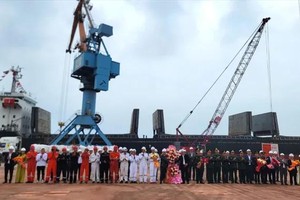As for expenditure, it is estimated that total spending will be at about VND5.4 quadrillion; the average state budget deficit will be about 3.8 percent of GDP; public debt by 2023 will be about 48.1 percent of GDP.
The Ministry of Finance also acknowledged that the severe impact of the Covid-19 pandemic had created challenges to the mid-term State budget plan in three years from 2021 to 2023 in terms of ensuring the schedule for wage reform, adjusting standards of social welfare, and the poverty line.
Therefore, to complete the State budget revenue and expenditure tasks, especially in 2021, the financial sector will consider continuing to implement the policies of tax and fee exemption, reduction, and extension to support enterprises to overcome difficulties caused by the Covid-19 pandemic. It will strengthen collection management, prevent revenue losses, strictly manage the expenses from the stage of estimation to the implementation, thoroughly save expenditures that are not actually urgent, and minimize spending for organizing conferences and seminars, domestic and overseas business trips, and the purchase of luxury equipment. It will also review obstacles to accelerate the disbursement of public investment capital, especially key national projects, with great pervasiveness, connectivity, and motivation for interregional socio-economic development.
The Ministry of Finance also acknowledged that the severe impact of the Covid-19 pandemic had created challenges to the mid-term State budget plan in three years from 2021 to 2023 in terms of ensuring the schedule for wage reform, adjusting standards of social welfare, and the poverty line.
Therefore, to complete the State budget revenue and expenditure tasks, especially in 2021, the financial sector will consider continuing to implement the policies of tax and fee exemption, reduction, and extension to support enterprises to overcome difficulties caused by the Covid-19 pandemic. It will strengthen collection management, prevent revenue losses, strictly manage the expenses from the stage of estimation to the implementation, thoroughly save expenditures that are not actually urgent, and minimize spending for organizing conferences and seminars, domestic and overseas business trips, and the purchase of luxury equipment. It will also review obstacles to accelerate the disbursement of public investment capital, especially key national projects, with great pervasiveness, connectivity, and motivation for interregional socio-economic development.
























